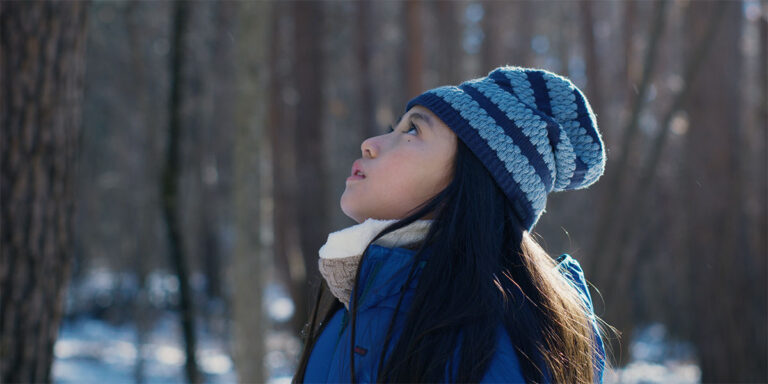Evil Does Not Exist (2023 | Japan | 106 minutes | Ryûsuke Hamaguchi)
It’s a provocative title: Evil does not exist. Or does it? And is it glamping? Ryûsuke Hamaguchi’s latest film is a mesmerizing interrogation of these questions that plays out like an enrapturing museum piece.
On the surface, the ecological parable is stirring meditation on the residents of a mountain village’s duty to community and the natural world … until it’s something else entirely. Much of the film’s first act revels in the quiet routines of rural life: a young girl marveling at swaying trees, friends collecting icy fresh water from a mountain stream to use in preparing the daily special at their restaurant, a man chopping wood with well-honed precision outside his mountain lodge. For long stretches, the camera takes a child’s wondrous perspective of the swaying of barren trees against a cold blue sky. As she and her father move throughout village life, the camera tells a story through placement and its curious attention to the people and landscapes who inhabit the town.
The village equilibrium is threatened when a talent agency arrives at a community meeting to pitch a pandemic-funded project to develop some of the undisturbed woodlands into a glamping resort for city-dwellers looking to get in touch with nature. The municipal proceedings are an exercise in politely-worded discourse, firm positions, and a duty to honor experiences that would do Frederick Wiseman proud. These discussions are both compelling and deeply moving in the degree of care expressed by long-term residents weary of the intrusion of tourists to their quiet village.
Just as we’ve come to match the rhythms of rural life the story shifts to nearby Tokyo where we meet the out-of-their-depth functionaries charged with hastily implementing the ill-conceived project before grant funding runs out. Rather than skewer them as fools, Hamaguchi grants them humanity and depth as they ponder the implications of what they’ve been hired to do. It’s an impressive film of quiet observation that twists its threads together into a surprising, dreamlike, and experimental third act in which the pristine mountain town casts its spell on the city slickers.
With parts originally intended as a visual accompaniment to Eiko Ishibashi’s stunning original score, Ryûsuke Hamaguchi’s camera is capable of telling a compelling story even without words. The cuts in soundtrack and camera position alone are stirring. I was enraptured for most of the film but was left deeply confused by its provocative final moments. As much as I appreciate leaving meaning to the viewer’s experience, I’d still love a translation of where it goes in the end.
This piece was written during the 2023 SAG-AFTRA strike. Without the labor of the actors currently on strike, the film being covered here wouldn’t exist. More information about the strikes can be found on the SAG-AFTRA Strike hubs. Donations to support striking workers can be made at the Entertainment Community Fund.




